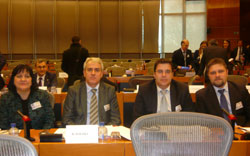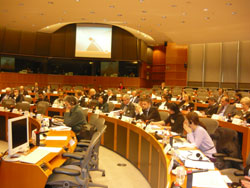Monday, 25 February 2013, Brussels
DELEGATION OF THE COMMITTEE ON ECONOMY AT THE PARLIAMENTARY SEMINAR ON ENERGY POLICY
 A Delegation of the Committee on Economy of the Assembly of the Republic of Macedonia, headed by the Chairperson of the Committee Ms. Vladanka Avirović and composed of Mr. Mališa Stanković - Deputy Chairperson of the Committee, Mr. Rexhail Ismaili and Mr. Dragan Cuklev, participated at the parliamentary seminar on the topic: "The EU energy policy and its impact on the pre-accession countries”, that was held on 21 and 22 February 2013 in the European Parliament in Brussels, Belgium.
A Delegation of the Committee on Economy of the Assembly of the Republic of Macedonia, headed by the Chairperson of the Committee Ms. Vladanka Avirović and composed of Mr. Mališa Stanković - Deputy Chairperson of the Committee, Mr. Rexhail Ismaili and Mr. Dragan Cuklev, participated at the parliamentary seminar on the topic: "The EU energy policy and its impact on the pre-accession countries”, that was held on 21 and 22 February 2013 in the European Parliament in Brussels, Belgium.
Members of the pre-accession countries' parliaments and of the European Parliament, as well as experts in the field of energy, participated at the seminar.
In her presentation, the Chairperson of the Committee of Economy Ms. Vladanka Avirović stressed the importance of the parliamentary seminar and said that the Republic of Macedonia, as a candidate country for membership in the European Union, is faced with the challenges of efficient implementation of the comprehensive reform of the social system.
The aspiration for European Union membership implies awareness about the need for fulfilment of the standards in various fields, especially in the energy sector.
The standards for cooperation in the energy sector in the European Union should reflect the principle of market economy and the provisions of the Energy Charter Treaty. The complete liberalization of the electricity and gas markets should be finalized by January 2015.
The Strategy for Development of the Energy Sector defines the most appropriate long-term development of the energy sector in the Republic of Macedonia with the aim of securing reliable, safe and high-quality supply of energy for the consumers in line with the following priorities: maintenance, revitalization and modernization of the existing and construction of new, modern infrastructures for the purposes of energy production and utilization; use of the domestic resources (lignite reserves, hydro-electric potential and solar energy); increased utilization of renewable energy sources; and establishing economic price of energy.
 Ms. Avirović emphasized especially the use of renewable energy sources, having in mind the fact that Macedonia has approximately 300 sunny days during the year. Also regarding renewable energy, the country is planning to build small hydro-electric plants and wind farms.
Ms. Avirović emphasized especially the use of renewable energy sources, having in mind the fact that Macedonia has approximately 300 sunny days during the year. Also regarding renewable energy, the country is planning to build small hydro-electric plants and wind farms.
The Republic of Macedonia has adopted the Action Plan for energy efficiency and during 2013 the relevant authorities will start with the preparation of the second action plan.
The new Law on Energy was adoption with the aim of further harmonization with the European legislation and fulfilment of the commitments of the country in the process of accession to the European Union and the obligations deriving from the Stabilization and Association Agreement and the Treaty Establishing the Energy Community.